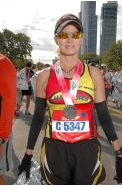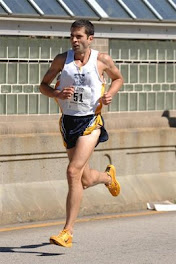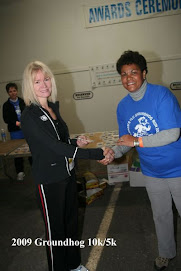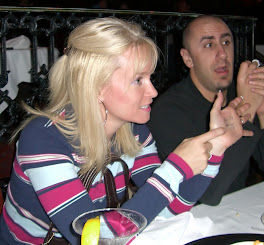In the past two weeks, I've heard from several fellow runners who also have suffered from stress fractures. And although I've tried to give some advice here and there in emails, I thought it would be useful to dedicate one entire blog entry to stress fractures (from running). So, this entry is intended for those of you who have a confirmed stress fracture, or aren't sure and think you might have one.
This experience has been the toughest thing I've gone through as a runner, but I want you to know that
you CAN do things to speed your healing, and you CAN come back stronger than ever. I am living testimony to both!Funny thing, only humans and racehorses get stress fractures.
Background: After several weeks of increasingly severe pain in my lower right leg (where I continued to run 50-55 mile weeks), I completed the
Chicago Marathon on October 12, 2008. A little over a week later an MRI confirmed a significant tibial stress fracture. Continuing to to run on the fracture is not something I'd condone. Stress fractures are serious business, and continuing to injure the area will lead to a complete break in the bone. As bad as taking a couple of months off of running might sound, having a few pins in your leg and being in a cast and on crutches for many weeks is far worse. And that brings me to my next point.
Get a confirmed MRI-based diagnosis. If you already have this, then you know for sure. If you've had an X-ray, and nothing showed up, request an MRI. Mine didn't show up on X-ray at first either. If you think you might have a stress fracture, please get this checked out immediately. What you do next depends very much on what kind of injury you have. A soft tissue injury is of a different nature, and while some things below might apply, many do not.
The bigger the bone, the longer recovery. Unfortunately, the tibia is the most common site of a stress fracture in a runner, and it's also one of the bigger bones. It simply takes more time to repair the damage.
Active recovery. I was diagnosed a little over three months ago. Neither my primary care physician (an Internist) nor my referred orthopedic surgeon had any specialties in sports medicine, nor were they athletes. My instructions were as follows: Do nothing for four months. At the end of that four months, I would be permitted to do some stationary bike pedaling with no resistance. A few weeks of that, and I could begin running again. I was initially horrified. And, in some cases, this amount of time off may be required. But I'll give you some suggestions below to help you heal faster and determine when you are ready to run. Whatever you do, don't stop moving. It keeps your blood flowing, your cardiovascular fitness maintained, and your mind in a better place.
Initial rest. In order for you to heal quickly, you need to do two things immediately: Get ALL stress off your fractured body part, and start filling your body with the building blocks you need to recover. We'll get to the latter in a moment. For a few weeks (if you caught this early and it's not too severe, this is about two weeks) take it very easy. Only walk when absolutely necessary. No grocery shopping, mall walking. Limit stair climbing. Give your bone time to start that initial mending process with zero interference. This should include allowing yourself to sleep a little extra each night. Sleep is the time your body restores itself.
Cross training. For the first few weeks, while you are getting to the place of "no pain," this should be undertaken carefully. My fracture was serious enough that even kicking in the water was painful. So, obvious cross training (like swimming or rowing or elliptical) were completely out. I lifted weights, especially upper body. After two weeks, you can begin incorporating other things like
aqua jogger, swimming, rowing, pedaling with low resistance, other obvious non-weight bearing activities. After another week or two, incorporate things like spin class or elliptical. Add lower-body strength training. The important thing is to get your heart rate up and keep it up, while maintaining muscle tone. The more cardiovascular fitness and strength you can hang onto, the easier your return to running will be. If anything causes you pain at the fracture site, stop immediately, and try again in a week or two.
Weight gain. You'll need to reduce your calorie intake, but don't worry too much about it. It's more important during this time to fill your body with what it needs to heal. I gained both muscle and a little fat during the process. If you're like me, you know what your body looks like at its peak. You might even have a special 'vein' that pops when you are super-fit. Get over it, you're going to lose that for a little while. Don't deny your body good, healthy food during this important time of recovery.
Get calcium supplements. Your body can only process 500 mg at a time, so plan on taking this twice per day. I like
Viactiv, as it's a chewy caramel. I pick them up at my local grocery store. Enjoy dairy products, if you can tolerate them. I now have organic whole milk yogurt each and every morning.
Get vitamin D supplements. You need 1000 mg (yes, 1 gram). Take that with the calcium, preferably with the first dose. Viactiv has some, but not enough. If you can get a little sunlight too, that's great.
Increase your protein intake. I like
muscle milk ready to drink form. It's readily available at GNC and many grocery stores.
Consider an aircast if you have a tibial fracture. Be sure it has the front tibial plate (otherwise, it's useless). I used
this. The front plate is removable. I have done runs in the air cast, and I have removed the front plate and put it into a moderate to heavy compression sock as well (like the kind you would buy at Walgreen's or Osco). You can take it off if you're just sitting around, or only walking a few feet. But if you are walking from the parking garage, or grocery shopping (you get the idea), put the cast on. It's useful for the first several weeks. Don't get a boot or a cast if you can avoid it, as you cannot walk normally and it will weaken other parts and make you more vulnerable to other injuries.
Don't take any pain meds. That includes any Acetomenefen (Tylenol) or NSAIDs (such as Ibuprofen or Naproxen Sodium). Pain is your body's most important communication line with you right now. Don't hamper it in anyway. This is one time if you feel any twinge of pain, you need to stop what you are doing immediately. Don't ride it out or push through it. In the case of a stress fracture, pain means more stress on the already fractured bone. Continued use will cause further damage and delay your recovery.
New shoes. Toss any running shoes with more than about 50 miles and start over with a fresh pair. You'll need as much cushioning as possible.
Readiness Testing. When you haven't felt ANY pain for about two weeks (this might be about four weeks from the last time you ran if you caught your fracture early; longer if more serious), give yourself the
60-minute walk test. This is a brisk walk on a treadmill so you can stop at the first twinge of pain if necessary. The 60-minute walk test is your friend. Make sure you can complete it successfully a couple of times before you even think about running. If your stress fracture flashes even once during this test, stop immediately. Light jogging will put about twice the stress on your bones as walking does. So, a four mile walk is equivalent to a two mile easy jog.
Those first runs. When you do go out for a test run, it's better to run, take two days off, run again. Make these about two mile runs. Remember, the force on your legs for light jogging is about twice that of walking. Gradually work into more runs during the week, substituting cross training workouts for runs. First week, just run twice, three days apart. Second week, try running three times. Third week, try every other day, and work into it that way. If you experience pain at the site of injury, stop for a few days and go back to your 60 minute walk test.
Soft surface training. When you do run, only run on soft earth for awhile. Gradually work in treadmill runs. Don't run on concrete or asphalt for quite a while.
Consider acupuncture. I never did this, but several folks recommended acupuncture to
stimulate the healing process. I have heard this is particularly good for stress fractures. I was about to finally try it, but ended up being able to run again.
Psychological issues. I had the pain long enough that it is entwined in my memory. I recently watched
Prince Caspian, and the hard marching of the soldiers as they went into battle, and seriously felt pain while sitting still. When I began running again, I felt lots of interesting sensations. Buzzing, itching... a heaviness, almost as if there were a bubble there on my leg. I still fear the pain. Not because I can't handle pain, actually I have quite a high tolerance of it. But I do fear what it would mean if my fracture suddenly got worse. I've been through some pretty dark days, and I got through them. If you need help dealing with this injury or just want to talk to ensure you are not crazy, feel free to direct message me in twitter, http://twitter.com/run350. I'm here to listen. There is also a stress fracture forum in
Runner's Lounge.
I'm back to running now, six days per week. I have been doing some light to moderate speedwork for about two weeks. My pace is better than it ever has been, and I feel quite strong. I think there are some specific reasons for that I won't go into here, but I do want you--as a fellow stress-fracture sufferer--to leave this blog entry knowing that you
can be back exactly where you were in just a few months, probably even faster and stronger. The rest might actually do you some good! Take advantage of it, and don't give up hope! You can recover from this, and unlike some soft tissue injuries that can linger for years, your bone will heal completely.
_s_jpg.jpg) My whole family came out to support me in this race, which was awesome, both logistically and mentally. We arrived very early, and enjoyed taking in the scene while I took my time in a nice, long, easy warm-up. I had four layers on, and gradually peeled layers off, tossing them by my kids, which was highly amusing.
My whole family came out to support me in this race, which was awesome, both logistically and mentally. We arrived very early, and enjoyed taking in the scene while I took my time in a nice, long, easy warm-up. I had four layers on, and gradually peeled layers off, tossing them by my kids, which was highly amusing._s_jpg.jpg) We waited through the awards ceremony. Funny, I would have had a solid win in the 35-39 female age division. I took 3rd in the female 40-44 with an official time of 22:37. Last year, there were well over 100 women in this age group, so I'm very pleased with placing this well. This was a solid PR for me, my previous PR being 23:38 from August of last year.
We waited through the awards ceremony. Funny, I would have had a solid win in the 35-39 female age division. I took 3rd in the female 40-44 with an official time of 22:37. Last year, there were well over 100 women in this age group, so I'm very pleased with placing this well. This was a solid PR for me, my previous PR being 23:38 from August of last year.


















_s_jpg.jpg)








